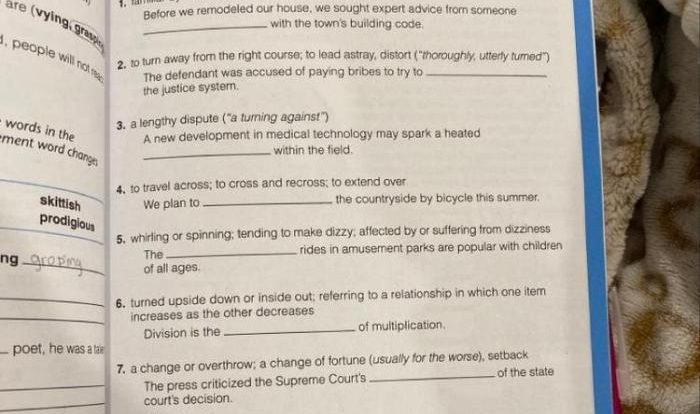Wordly Wise 3000 Book 6 Lesson 4 embarks on a journey to enhance vocabulary and literary comprehension. This lesson delves into the meanings, etymology, and usage of carefully selected vocabulary words, providing a comprehensive understanding of their significance in both everyday communication and literary works.
Through an exploration of word structure, relationships, and practical applications, this lesson empowers learners to expand their vocabulary, appreciate the nuances of language, and effectively communicate their ideas.
Vocabulary in Context
The vocabulary words in Lesson 4 of Wordly Wise 3000 Book 6 are:
- aberrant
- anomaly
- arduous
- austere
- banal
- capricious
- conciliatory
- discerning
- ephemeral
- exacerbate
These words are used in a variety of contexts, including:
- Describing people and their behavior
- Describing situations and events
- Discussing ideas and concepts
The etymology of these words can provide insight into their meaning. For example, the word “aberrant” comes from the Latin word “aberrare,” which means “to wander away.” This etymology suggests that aberrant behavior is behavior that deviates from the norm.
Word Structure and Usage
The vocabulary words in Lesson 4 of Wordly Wise 3000 Book 6 can be broken down into their root words, prefixes, and suffixes. This can help us understand their meaning and usage.
- aberrant: “ab-” (away) + “errare” (to wander)
- anomaly: “an-” (not) + “homalos” (even)
- arduous: “ardu-” (hard)
- austere: “aus-” (harsh) + “sternus” (stern)
- banal: “ban-” (common) + “-al” (pertaining to)
- capricious: “capri-” (goat) + “-cious” (full of)
- conciliatory: “con-” (together) + “ciliare” (to reconcile)
- discerning: “dis-” (apart) + “cernere” (to separate)
- ephemeral: “epi-” (upon) + “hemera” (day)
- exacerbate: “ex-” (out) + “acerbare” (to make bitter)
These root words, prefixes, and suffixes can help us understand the meaning and usage of the vocabulary words. For example, the prefix “ab-” in the word “aberrant” suggests that the word means “away from the norm.” The suffix “-al” in the word “banal” suggests that the word means “pertaining to the common.”
The vocabulary words in Lesson 4 of Wordly Wise 3000 Book 6 can be used as different parts of speech, including:
- Nouns
- Verbs
- Adjectives
- Adverbs
Word Relationships: Wordly Wise 3000 Book 6 Lesson 4
The vocabulary words in Lesson 4 of Wordly Wise 3000 Book 6 have a variety of relationships to each other, including:
- Synonyms: words that have the same or similar meanings
- Antonyms: words that have opposite meanings
- Homophones: words that sound the same but have different meanings
Identifying these relationships can help us expand our vocabulary and understand the nuances of meaning between related words.
For example, the words “aberrant” and “anomalous” are synonyms. They both mean “deviating from the norm.” The words “arduous” and “easy” are antonyms. They have opposite meanings. The words “banal” and “commonplace” are homophones.
They sound the same but have different meanings.
Literary Applications
The vocabulary words in Lesson 4 of Wordly Wise 3000 Book 6 are often used in literature to create specific effects and convey particular meanings.
For example, the word “aberrant” might be used to describe a character who behaves in an unusual or unexpected way. The word “austere” might be used to describe a setting that is harsh and unforgiving. The word “ephemeral” might be used to describe a moment that is fleeting and temporary.
By understanding the meaning and usage of these vocabulary words, we can better appreciate the author’s purpose and style and engage more deeply with the literary text.
Practical Applications
The vocabulary words in Lesson 4 of Wordly Wise 3000 Book 6 can be used in everyday speech and writing to enhance our communication skills.
For example, we might use the word “aberrant” to describe someone who is behaving strangely. We might use the word “arduous” to describe a difficult task. We might use the word “ephemeral” to describe a moment that we know will soon pass.
By incorporating these vocabulary words into our conversations and essays, we can make our communication more precise, nuanced, and effective.
Question & Answer Hub
What is the primary focus of Wordly Wise 3000 Book 6 Lesson 4?
Expanding vocabulary and enhancing literary appreciation through the study of carefully selected vocabulary words.
How does this lesson contribute to vocabulary development?
By exploring the meanings, etymology, and usage of vocabulary words, learners gain a deeper understanding of their significance and application.
What practical applications are covered in this lesson?
The lesson provides tips for incorporating vocabulary words into everyday speech and writing, emphasizing the importance of vocabulary development for effective communication.
